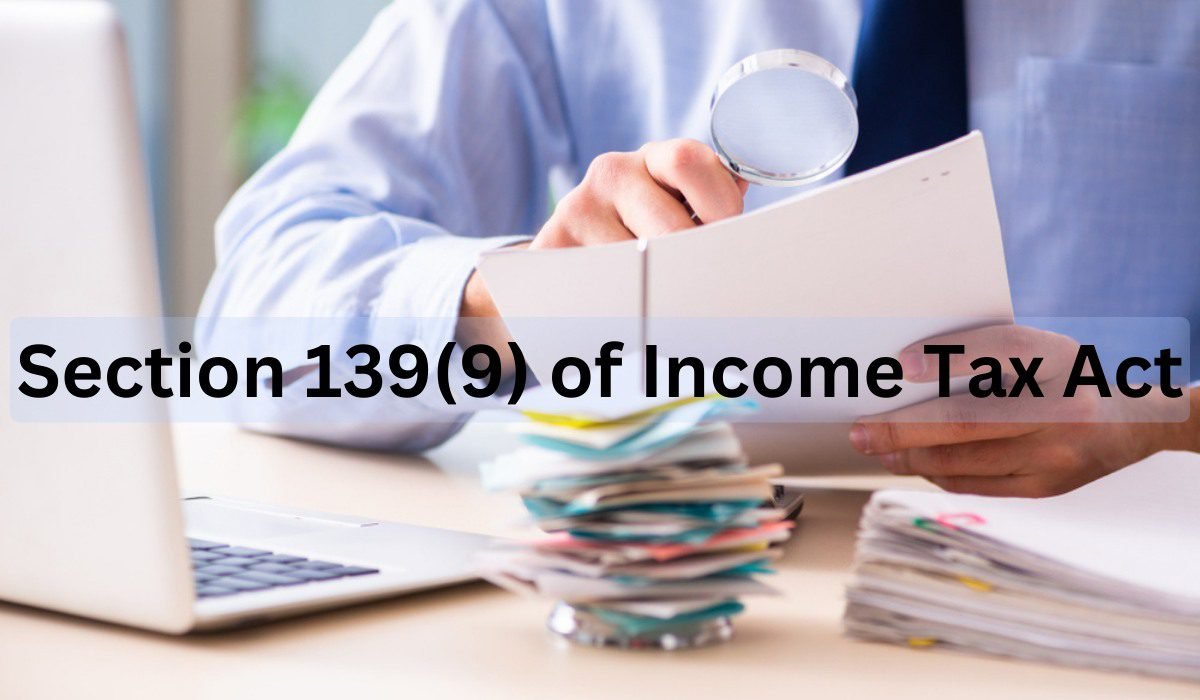Section 139(9) of the Income Tax Act, 1961, plays a crucial role in ensuring the accuracy and completeness of the information provided by taxpayers in their income tax returns. This section empowers the Income Tax Department to rectify errors or omissions in the return of income filed by an assessee. Making small errors or typographical mistakes in your tax returns can be a cause for concern, but there’s a safety net in place. The Income Tax Department issues notices to enable you to rectify any mistakes you might have made. The rules and procedures concerning these notices for defective returns are outlined in Section 139(9) of the Income Tax Act, 1961.
See also: Who is exempt from income tax in India? What is Section 10?
What is Section 139(9) of the Income Tax Act?
Section 139(9) of the Income Tax Act pertains to the comprehension of a defective return in the context of income tax. A defective return, as delineated by this section, encompasses a tax return that is characterised by incompleteness, inaccuracy, or non-compliance with the stipulated guidelines established by the Income Tax Department of India. Taxpayers must submit returns that are both accurate and comprehensive, as failure to do so may result in the imposition of penalties and legal repercussions. Therefore, adherence to the prescribed guidelines and the meticulous completion of tax returns are crucial to mitigate the potential adverse consequences associated with a defective return.
What are the common errors that make tax returns defective?
Section 139(9) of the Income Tax Act highlights the significance of steering clear of common errors that render tax returns defective. To ensure the integrity of your tax return, it is crucial to be mindful of the following potential pitfalls:
Incorrect personal details
Accurate information is pivotal. Ensure that your name, address, and PAN (Permanent Account Number) are entered without errors. Any inaccuracies in these particulars may complicate the processing of your tax return.
Inaccurate income reporting
Exercise diligence in reporting your income accurately. This involves comprehensive disclosure of all income sources, such as salary, rental income, interest, and dividends. Failure to report any income can lead to penalties and scrutiny from tax authorities.
Incorrect deductions and exemptions
While capitalising on available deductions and exemptions is encouraged, it is imperative to claim them accurately. Missteps in claiming deductions or exemptions may result in penalties and additional tax liabilities.
Errors in tax calculations
Scrutinise your tax calculations for accuracy. Mistakes in these calculations can lead to an incorrect tax liability, potentially triggering audits or investigations by the tax department.
Non-disclosure of foreign assets
If you possess any foreign assets, such as bank accounts or properties, disclosure is paramount. Failure to disclose these assets in your tax return can result in severe penalties and legal consequences.
What are the things that should be done after receiving the notice?
When confronted with a notice under Section 139(9) of the Income Tax Act 1961, it’s natural to experience a sense of concern. However, it is crucial to approach the situation promptly and with precision. The following steps should be taken after receiving such a notice to ensure compliance and rectify any discrepancies:
Timely response
The foremost action is to respond promptly to the notice. The tax return needs to be revised and corrected within 15 days of receiving the notice. This timeframe is critical, and adherence to it is essential to demonstrate cooperation with tax authorities.
Application for extension
If, for any valid reason, you require additional time to prepare and file the revised return, you have the option to write an application to the Assessing Officer. Request an extended deadline, providing a detailed explanation for the need for an extension. However, it’s imperative to note that any such application should be submitted within the initial 15-day period.
Risk of invalidation
Failure to respond within the stipulated 15 days or within any granted extension can have serious consequences. The original return initially filed will be deemed invalid, potentially leading to further complications and inquiries from tax authorities.
What is the consequence of inaction after receiving the notice?
Failing to take appropriate action upon receiving a notice under Section 139(9) of the Income Tax Act carries significant consequences. In the event of inaction, the previously submitted defective return stands the risk of being categorised as invalid or non-filed. This implies that the Income Tax Department will treat the situation as if you had not filed a return for that specific financial year.
The implications of this outcome are twofold. Firstly, the invalidation of the original return means that any potential refund due to you will not be processed by the tax department. The non-processing of refunds is a direct repercussion of the deemed non-filing status of the return, creating financial implications for the taxpayer.
In essence, the failure to address the notice within the stipulated timeframe leads to the erasure of the previously filed return from the records, with associated consequences such as the denial of potential refunds. Consequently, it is imperative to respond promptly to the notice, revise the return as necessary, and adhere to the prescribed procedures to ensure the legitimacy of the filing and prevent adverse repercussions on financial matters.
How to respond to the notice?
Addressing a notice under Section 139(9) of the Income Tax Act necessitates a methodical and timely response. Here’s a comprehensive guide on how to effectively navigate through the process:
Understanding the notice
Begin by thoroughly reading the notice to discern the specific reason for the identified discrepancy in your tax return. The notice might highlight issues related to incorrect income details, deductions, or other pertinent information.
Gathering supporting documents
Assemble all relevant documents that can substantiate the accuracy of your tax return. This may include bank statements, salary slips, investment proofs, and any other paperwork crucial for rectifying the identified discrepancy.
Consulting a tax professional
If uncertainty arises or you require expert guidance, consider consulting a tax professional. A tax advisor can provide valuable insights, ensuring that your response aligns with regulatory requirements and effectively addresses the concerns raised in the notice.
Making corrections online
Utilise the official online portal of the Income Tax Department to access the e-filing dashboard. Here, you can make the necessary corrections to your tax return electronically. This online platform streamlines the process and allows for a convenient and efficient correction mechanism.
Submission of response
Submit your response along with the supporting documents to the income tax department within the stipulated time frame mentioned in the notice. Adherence to the specified deadline is crucial to avoid potential penalties or further complications. The submission can be made through the designated channels indicated in the notice or via the online portal.
FAQs
What is Section 139(9) of the Income Tax Act?
Section 139(9) empowers the Income Tax Department to rectify errors or omissions in the income tax returns filed by taxpayers, ensuring accuracy and completeness.
Why is Section 139(9) important for taxpayers?
This section is crucial as it allows the correction of mistakes in tax returns, preventing potential penalties and legal consequences.
What are the common errors that make tax returns defective under Section 139(9)?
Common errors include incorrect personal details, inaccurate income reporting, mistakes in claiming deductions, errors in tax calculations, and non-disclosure of foreign assets.
How does the Income Tax Department notify taxpayers under Section 139(9)?
Taxpayers receive notices pointing out discrepancies in their returns, urging them to rectify the issues within a specified timeframe.
What should I do if I receive a notice under Section 139(9)?
Respond promptly by understanding the notice, gathering supporting documents, and making necessary corrections through the official online portal or with the assistance of a tax professional.
Can I request an extension for responding to the notice under Section 139(9)?
Yes, you can write an application to the Assessing Officer, providing a valid reason for an extension. However, this request must be submitted within the initial 15-day period.
What happens if I don't respond to the notice within the specified timeframe?
Inaction may lead to the original return being deemed invalid, resulting in the Income Tax Department treating it as if you had not filed a return for that financial year.
| Got any questions or point of view on our article? We would love to hear from you. Write to our Editor-in-Chief Jhumur Ghosh at [email protected] |

Shimon Oberoi, an economics graduate from Rajdhani College, University of Delhi, strives to simplify the real estate world through her compelling and well-researched content. She has experience in domains like entertainment and economic concepts, among others. When not creating content, she enjoys watching movies, listening to music, and reading fictional books.











